Impact of Mindfulness on Stress and Coping in University Students
VerifiedAdded on 2020/04/07
|12
|2757
|308
AI Summary
The purpose of this research is to determine the effects of mindfulness on coping behavior in university students, specifically assessing how stress influences mindfulness and its subsequent impact on coping strategies. The study reveals no significant variations between conditions on the mindfulness trait when induced by stress, indicating that higher mindfulness does not correlate with reduced perceived stress or maladaptive coping. Higher mindfulness levels were associated with healthier lifestyle choices such as reduced alcohol consumption and smoking cessation. Contrary to expectations, inconsistencies arose in comparison with other studies focusing on stress, coping, mindfulness, and substance use among students. Overall, the findings suggest that while mindfulness may offer benefits for individual well-being, its effectiveness varies depending on specific contexts and individual differences.
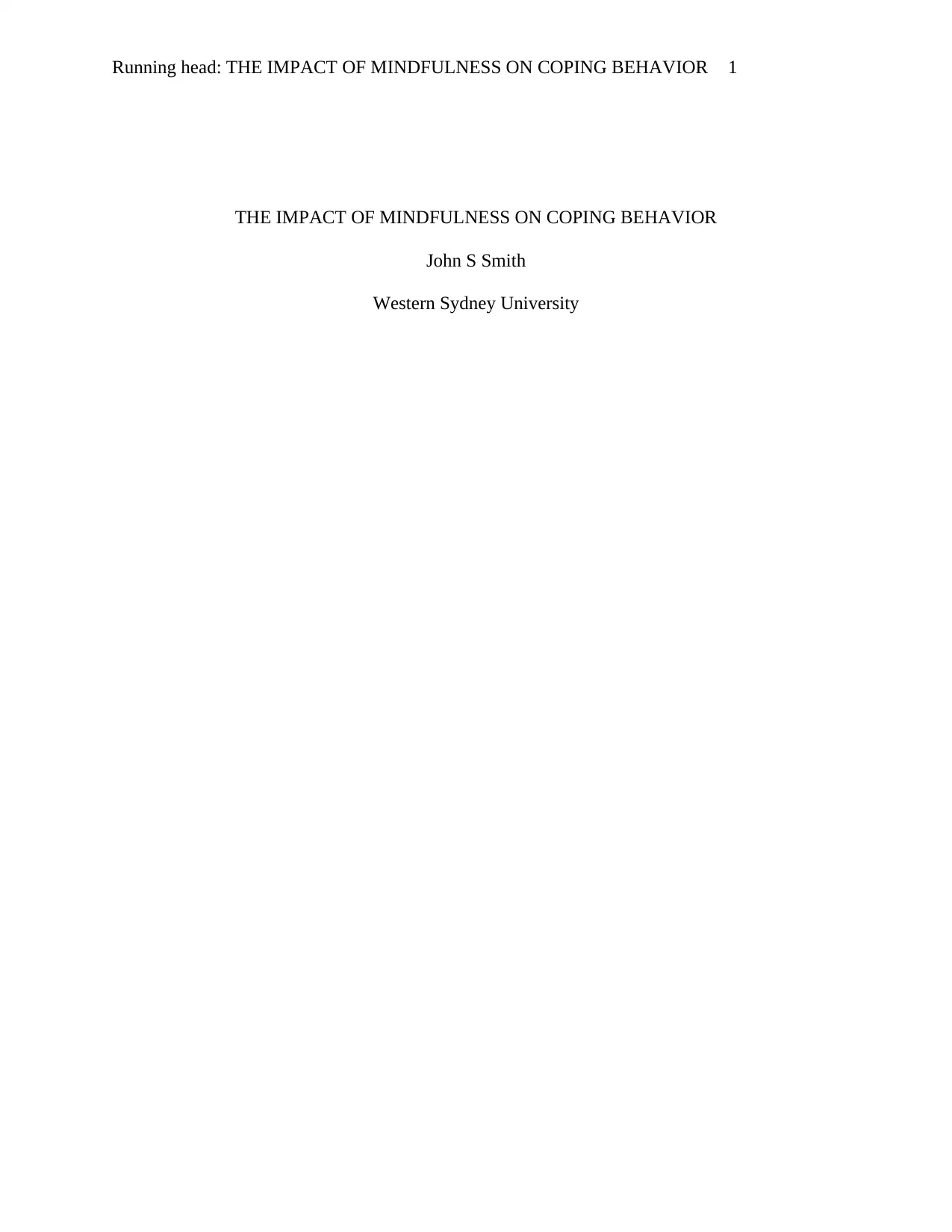
Running head: THE IMPACT OF MINDFULNESS ON COPING BEHAVIOR 1
THE IMPACT OF MINDFULNESS ON COPING BEHAVIOR
John S Smith
Western Sydney University
THE IMPACT OF MINDFULNESS ON COPING BEHAVIOR
John S Smith
Western Sydney University
Paraphrase This Document
Need a fresh take? Get an instant paraphrase of this document with our AI Paraphraser
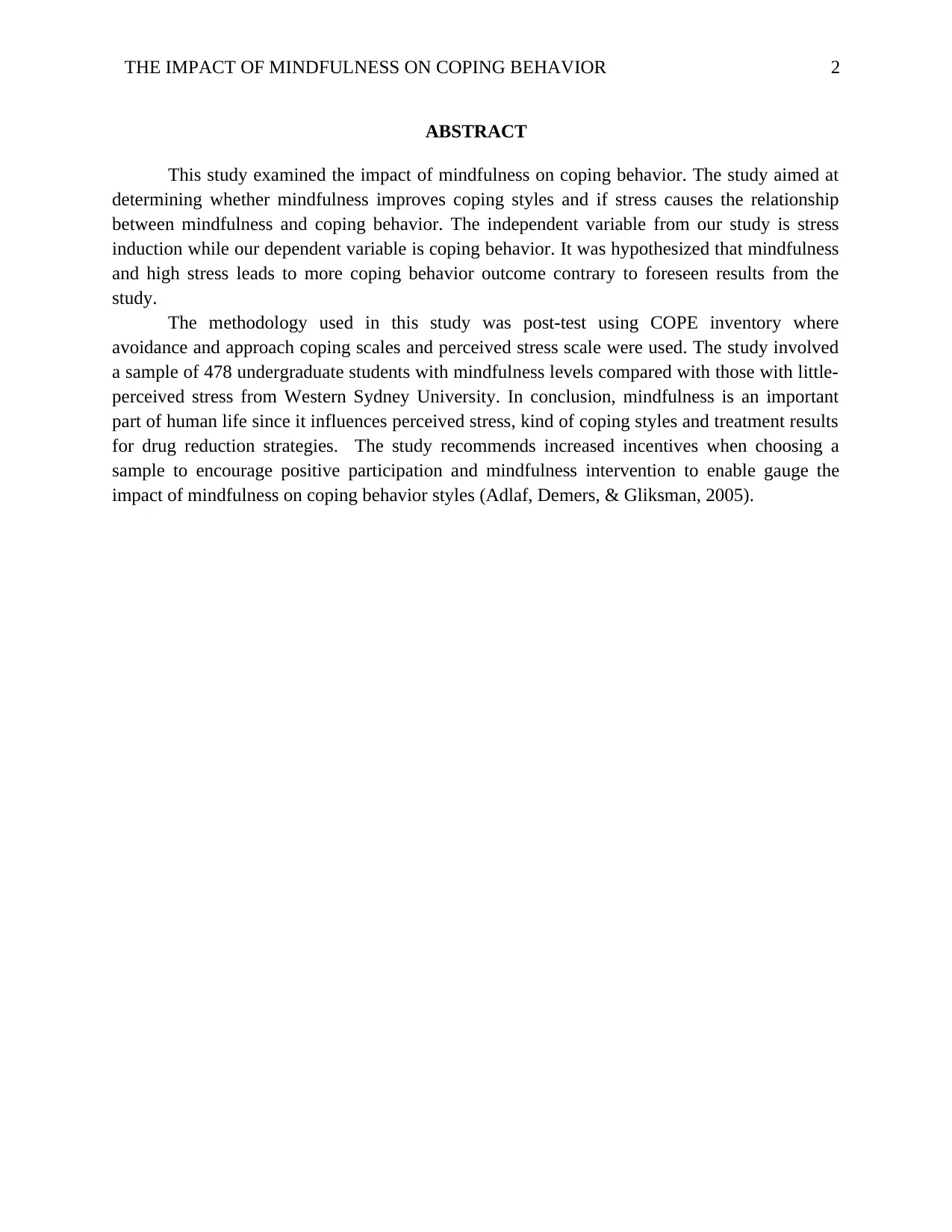
THE IMPACT OF MINDFULNESS ON COPING BEHAVIOR 2
ABSTRACT
This study examined the impact of mindfulness on coping behavior. The study aimed at
determining whether mindfulness improves coping styles and if stress causes the relationship
between mindfulness and coping behavior. The independent variable from our study is stress
induction while our dependent variable is coping behavior. It was hypothesized that mindfulness
and high stress leads to more coping behavior outcome contrary to foreseen results from the
study.
The methodology used in this study was post-test using COPE inventory where
avoidance and approach coping scales and perceived stress scale were used. The study involved
a sample of 478 undergraduate students with mindfulness levels compared with those with little-
perceived stress from Western Sydney University. In conclusion, mindfulness is an important
part of human life since it influences perceived stress, kind of coping styles and treatment results
for drug reduction strategies. The study recommends increased incentives when choosing a
sample to encourage positive participation and mindfulness intervention to enable gauge the
impact of mindfulness on coping behavior styles (Adlaf, Demers, & Gliksman, 2005).
ABSTRACT
This study examined the impact of mindfulness on coping behavior. The study aimed at
determining whether mindfulness improves coping styles and if stress causes the relationship
between mindfulness and coping behavior. The independent variable from our study is stress
induction while our dependent variable is coping behavior. It was hypothesized that mindfulness
and high stress leads to more coping behavior outcome contrary to foreseen results from the
study.
The methodology used in this study was post-test using COPE inventory where
avoidance and approach coping scales and perceived stress scale were used. The study involved
a sample of 478 undergraduate students with mindfulness levels compared with those with little-
perceived stress from Western Sydney University. In conclusion, mindfulness is an important
part of human life since it influences perceived stress, kind of coping styles and treatment results
for drug reduction strategies. The study recommends increased incentives when choosing a
sample to encourage positive participation and mindfulness intervention to enable gauge the
impact of mindfulness on coping behavior styles (Adlaf, Demers, & Gliksman, 2005).
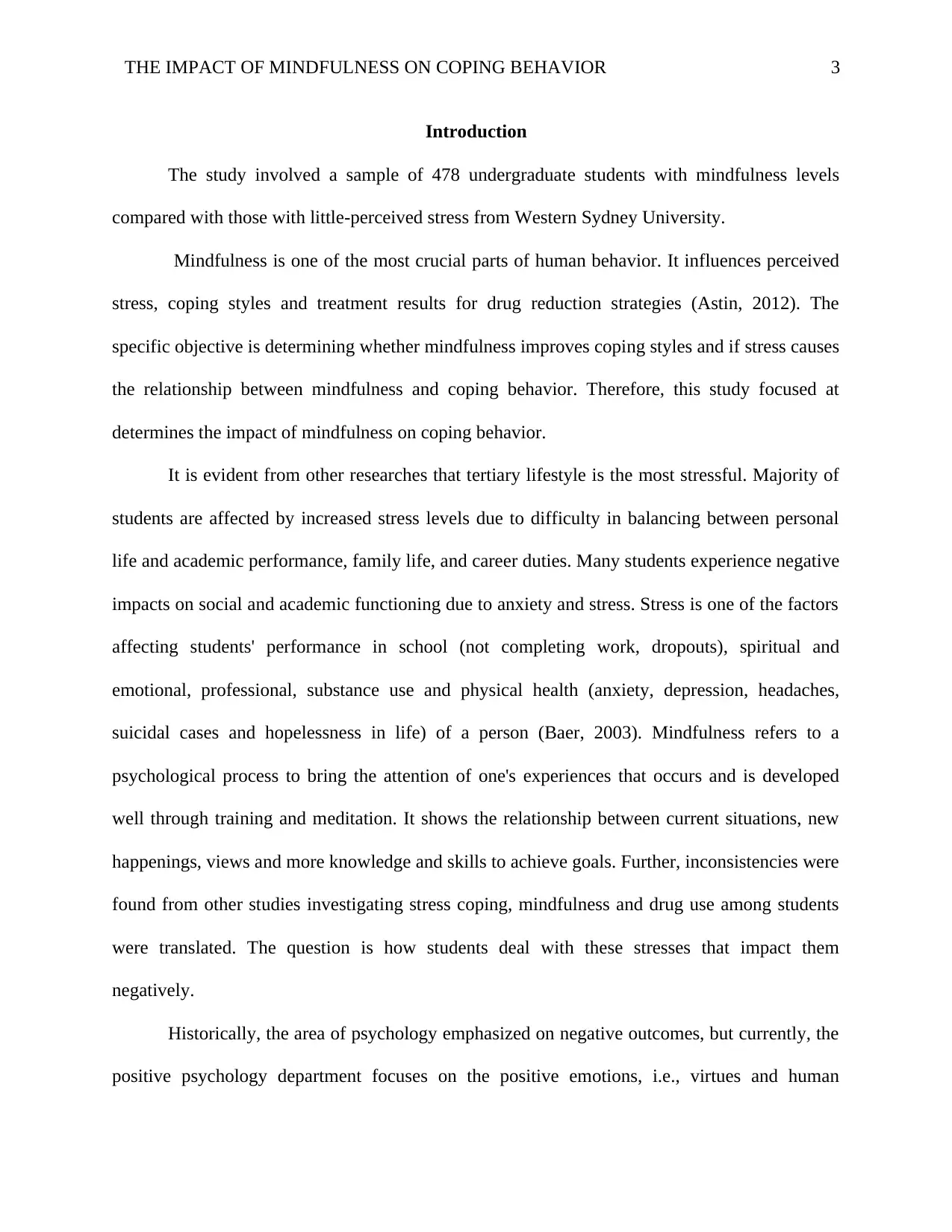
THE IMPACT OF MINDFULNESS ON COPING BEHAVIOR 3
Introduction
The study involved a sample of 478 undergraduate students with mindfulness levels
compared with those with little-perceived stress from Western Sydney University.
Mindfulness is one of the most crucial parts of human behavior. It influences perceived
stress, coping styles and treatment results for drug reduction strategies (Astin, 2012). The
specific objective is determining whether mindfulness improves coping styles and if stress causes
the relationship between mindfulness and coping behavior. Therefore, this study focused at
determines the impact of mindfulness on coping behavior.
It is evident from other researches that tertiary lifestyle is the most stressful. Majority of
students are affected by increased stress levels due to difficulty in balancing between personal
life and academic performance, family life, and career duties. Many students experience negative
impacts on social and academic functioning due to anxiety and stress. Stress is one of the factors
affecting students' performance in school (not completing work, dropouts), spiritual and
emotional, professional, substance use and physical health (anxiety, depression, headaches,
suicidal cases and hopelessness in life) of a person (Baer, 2003). Mindfulness refers to a
psychological process to bring the attention of one's experiences that occurs and is developed
well through training and meditation. It shows the relationship between current situations, new
happenings, views and more knowledge and skills to achieve goals. Further, inconsistencies were
found from other studies investigating stress coping, mindfulness and drug use among students
were translated. The question is how students deal with these stresses that impact them
negatively.
Historically, the area of psychology emphasized on negative outcomes, but currently, the
positive psychology department focuses on the positive emotions, i.e., virtues and human
Introduction
The study involved a sample of 478 undergraduate students with mindfulness levels
compared with those with little-perceived stress from Western Sydney University.
Mindfulness is one of the most crucial parts of human behavior. It influences perceived
stress, coping styles and treatment results for drug reduction strategies (Astin, 2012). The
specific objective is determining whether mindfulness improves coping styles and if stress causes
the relationship between mindfulness and coping behavior. Therefore, this study focused at
determines the impact of mindfulness on coping behavior.
It is evident from other researches that tertiary lifestyle is the most stressful. Majority of
students are affected by increased stress levels due to difficulty in balancing between personal
life and academic performance, family life, and career duties. Many students experience negative
impacts on social and academic functioning due to anxiety and stress. Stress is one of the factors
affecting students' performance in school (not completing work, dropouts), spiritual and
emotional, professional, substance use and physical health (anxiety, depression, headaches,
suicidal cases and hopelessness in life) of a person (Baer, 2003). Mindfulness refers to a
psychological process to bring the attention of one's experiences that occurs and is developed
well through training and meditation. It shows the relationship between current situations, new
happenings, views and more knowledge and skills to achieve goals. Further, inconsistencies were
found from other studies investigating stress coping, mindfulness and drug use among students
were translated. The question is how students deal with these stresses that impact them
negatively.
Historically, the area of psychology emphasized on negative outcomes, but currently, the
positive psychology department focuses on the positive emotions, i.e., virtues and human
⊘ This is a preview!⊘
Do you want full access?
Subscribe today to unlock all pages.

Trusted by 1+ million students worldwide
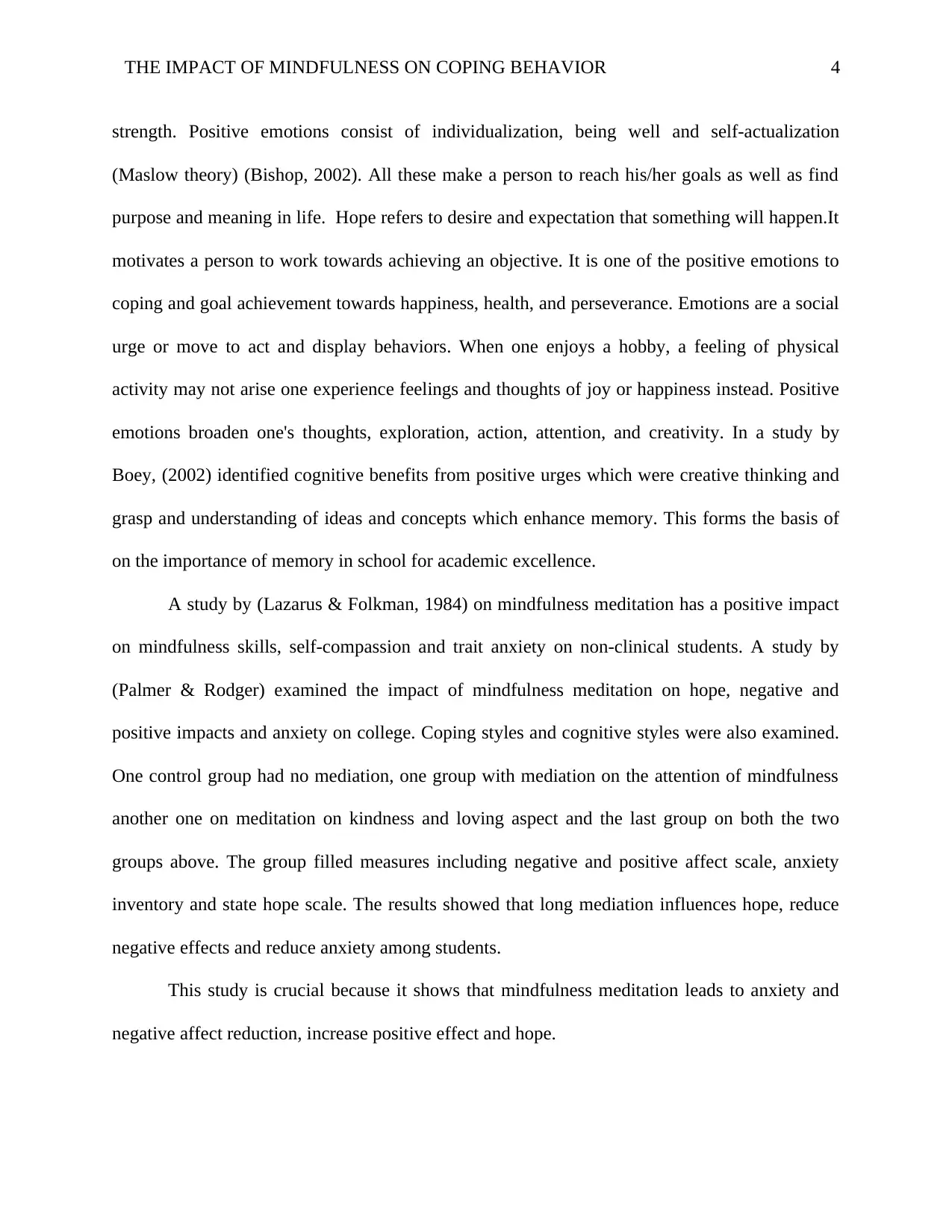
THE IMPACT OF MINDFULNESS ON COPING BEHAVIOR 4
strength. Positive emotions consist of individualization, being well and self-actualization
(Maslow theory) (Bishop, 2002). All these make a person to reach his/her goals as well as find
purpose and meaning in life. Hope refers to desire and expectation that something will happen.It
motivates a person to work towards achieving an objective. It is one of the positive emotions to
coping and goal achievement towards happiness, health, and perseverance. Emotions are a social
urge or move to act and display behaviors. When one enjoys a hobby, a feeling of physical
activity may not arise one experience feelings and thoughts of joy or happiness instead. Positive
emotions broaden one's thoughts, exploration, action, attention, and creativity. In a study by
Boey, (2002) identified cognitive benefits from positive urges which were creative thinking and
grasp and understanding of ideas and concepts which enhance memory. This forms the basis of
on the importance of memory in school for academic excellence.
A study by (Lazarus & Folkman, 1984) on mindfulness meditation has a positive impact
on mindfulness skills, self-compassion and trait anxiety on non-clinical students. A study by
(Palmer & Rodger) examined the impact of mindfulness meditation on hope, negative and
positive impacts and anxiety on college. Coping styles and cognitive styles were also examined.
One control group had no mediation, one group with mediation on the attention of mindfulness
another one on meditation on kindness and loving aspect and the last group on both the two
groups above. The group filled measures including negative and positive affect scale, anxiety
inventory and state hope scale. The results showed that long mediation influences hope, reduce
negative effects and reduce anxiety among students.
This study is crucial because it shows that mindfulness meditation leads to anxiety and
negative affect reduction, increase positive effect and hope.
strength. Positive emotions consist of individualization, being well and self-actualization
(Maslow theory) (Bishop, 2002). All these make a person to reach his/her goals as well as find
purpose and meaning in life. Hope refers to desire and expectation that something will happen.It
motivates a person to work towards achieving an objective. It is one of the positive emotions to
coping and goal achievement towards happiness, health, and perseverance. Emotions are a social
urge or move to act and display behaviors. When one enjoys a hobby, a feeling of physical
activity may not arise one experience feelings and thoughts of joy or happiness instead. Positive
emotions broaden one's thoughts, exploration, action, attention, and creativity. In a study by
Boey, (2002) identified cognitive benefits from positive urges which were creative thinking and
grasp and understanding of ideas and concepts which enhance memory. This forms the basis of
on the importance of memory in school for academic excellence.
A study by (Lazarus & Folkman, 1984) on mindfulness meditation has a positive impact
on mindfulness skills, self-compassion and trait anxiety on non-clinical students. A study by
(Palmer & Rodger) examined the impact of mindfulness meditation on hope, negative and
positive impacts and anxiety on college. Coping styles and cognitive styles were also examined.
One control group had no mediation, one group with mediation on the attention of mindfulness
another one on meditation on kindness and loving aspect and the last group on both the two
groups above. The group filled measures including negative and positive affect scale, anxiety
inventory and state hope scale. The results showed that long mediation influences hope, reduce
negative effects and reduce anxiety among students.
This study is crucial because it shows that mindfulness meditation leads to anxiety and
negative affect reduction, increase positive effect and hope.
Paraphrase This Document
Need a fresh take? Get an instant paraphrase of this document with our AI Paraphraser
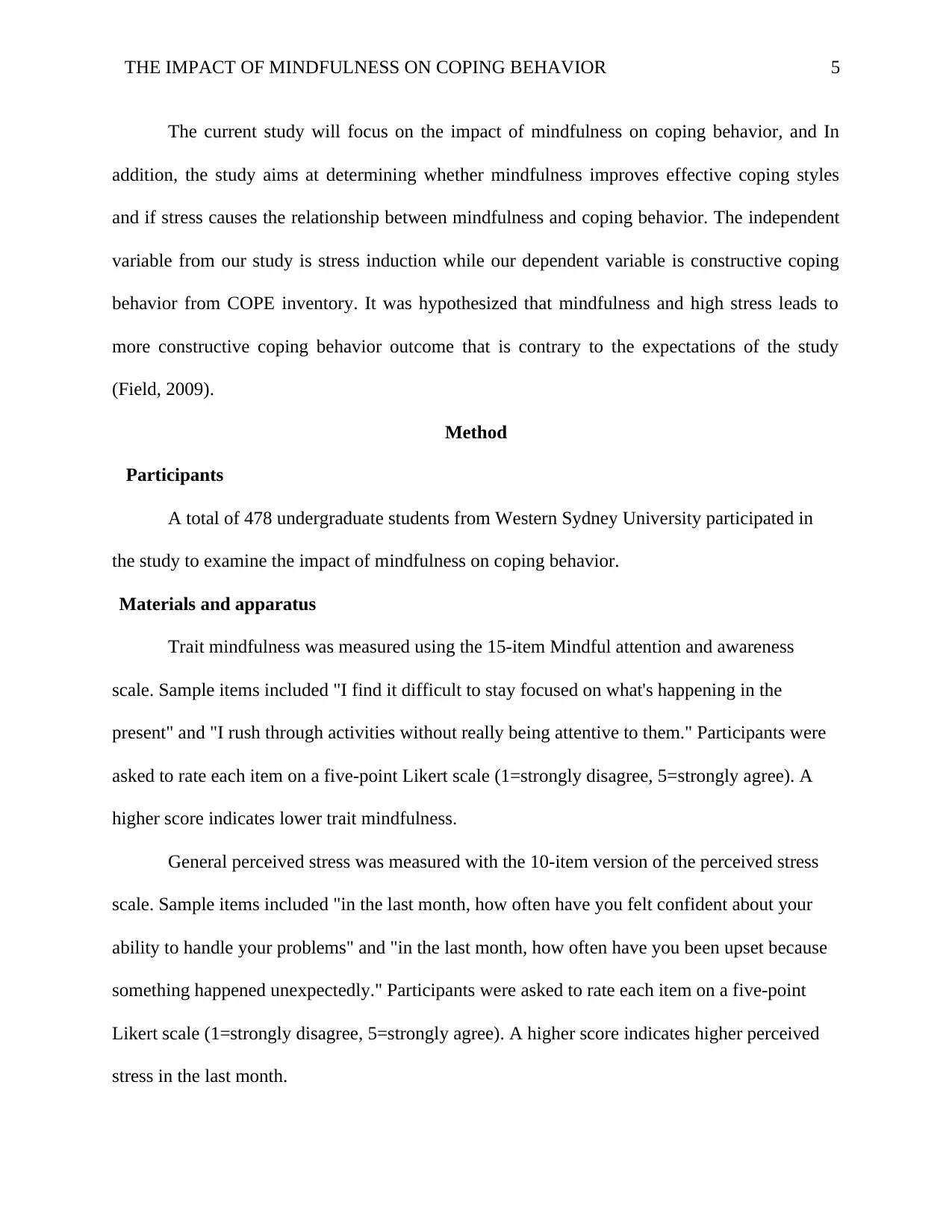
THE IMPACT OF MINDFULNESS ON COPING BEHAVIOR 5
The current study will focus on the impact of mindfulness on coping behavior, and In
addition, the study aims at determining whether mindfulness improves effective coping styles
and if stress causes the relationship between mindfulness and coping behavior. The independent
variable from our study is stress induction while our dependent variable is constructive coping
behavior from COPE inventory. It was hypothesized that mindfulness and high stress leads to
more constructive coping behavior outcome that is contrary to the expectations of the study
(Field, 2009).
Method
Participants
A total of 478 undergraduate students from Western Sydney University participated in
the study to examine the impact of mindfulness on coping behavior.
Materials and apparatus
Trait mindfulness was measured using the 15-item Mindful attention and awareness
scale. Sample items included "I find it difficult to stay focused on what's happening in the
present" and "I rush through activities without really being attentive to them." Participants were
asked to rate each item on a five-point Likert scale (1=strongly disagree, 5=strongly agree). A
higher score indicates lower trait mindfulness.
General perceived stress was measured with the 10-item version of the perceived stress
scale. Sample items included "in the last month, how often have you felt confident about your
ability to handle your problems" and "in the last month, how often have you been upset because
something happened unexpectedly." Participants were asked to rate each item on a five-point
Likert scale (1=strongly disagree, 5=strongly agree). A higher score indicates higher perceived
stress in the last month.
The current study will focus on the impact of mindfulness on coping behavior, and In
addition, the study aims at determining whether mindfulness improves effective coping styles
and if stress causes the relationship between mindfulness and coping behavior. The independent
variable from our study is stress induction while our dependent variable is constructive coping
behavior from COPE inventory. It was hypothesized that mindfulness and high stress leads to
more constructive coping behavior outcome that is contrary to the expectations of the study
(Field, 2009).
Method
Participants
A total of 478 undergraduate students from Western Sydney University participated in
the study to examine the impact of mindfulness on coping behavior.
Materials and apparatus
Trait mindfulness was measured using the 15-item Mindful attention and awareness
scale. Sample items included "I find it difficult to stay focused on what's happening in the
present" and "I rush through activities without really being attentive to them." Participants were
asked to rate each item on a five-point Likert scale (1=strongly disagree, 5=strongly agree). A
higher score indicates lower trait mindfulness.
General perceived stress was measured with the 10-item version of the perceived stress
scale. Sample items included "in the last month, how often have you felt confident about your
ability to handle your problems" and "in the last month, how often have you been upset because
something happened unexpectedly." Participants were asked to rate each item on a five-point
Likert scale (1=strongly disagree, 5=strongly agree). A higher score indicates higher perceived
stress in the last month.
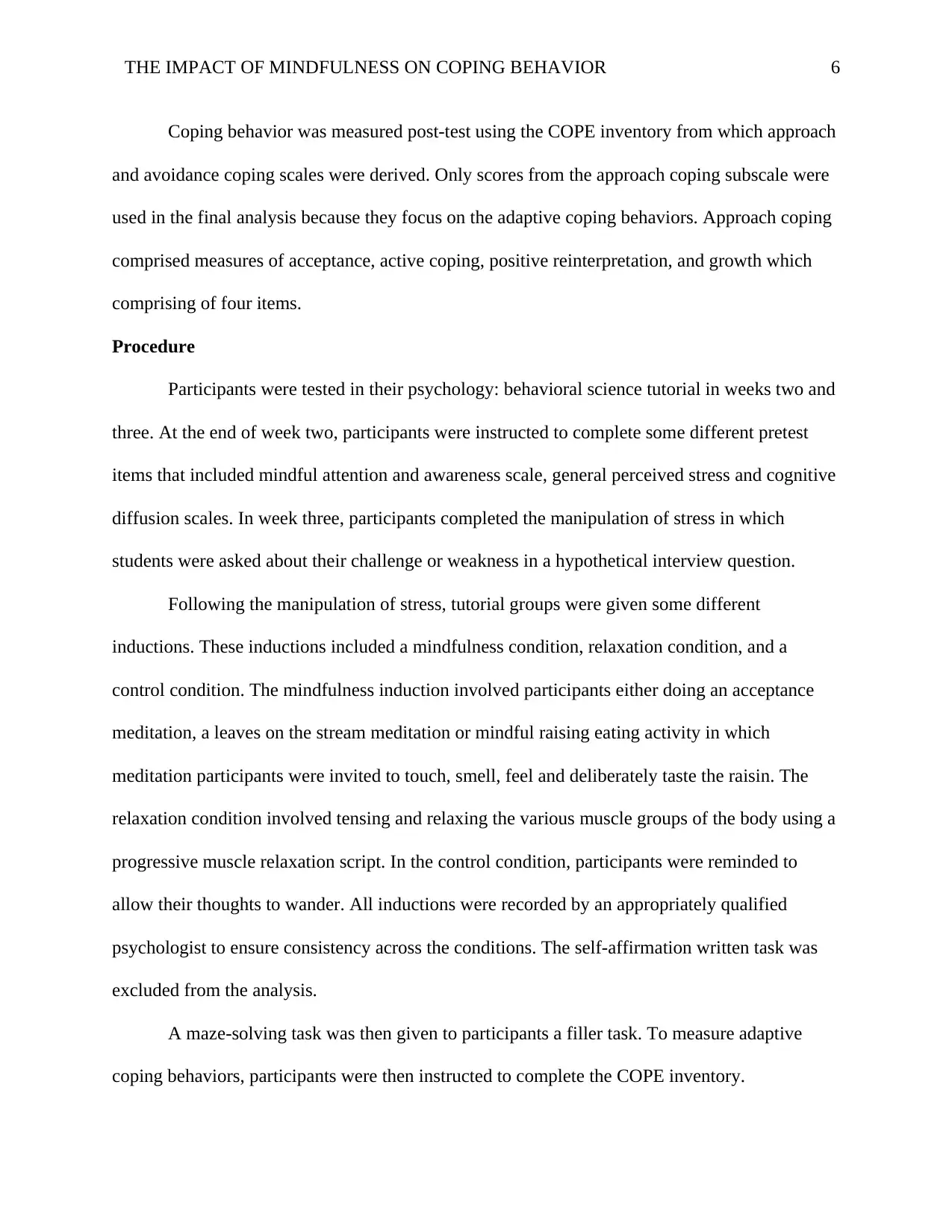
THE IMPACT OF MINDFULNESS ON COPING BEHAVIOR 6
Coping behavior was measured post-test using the COPE inventory from which approach
and avoidance coping scales were derived. Only scores from the approach coping subscale were
used in the final analysis because they focus on the adaptive coping behaviors. Approach coping
comprised measures of acceptance, active coping, positive reinterpretation, and growth which
comprising of four items.
Procedure
Participants were tested in their psychology: behavioral science tutorial in weeks two and
three. At the end of week two, participants were instructed to complete some different pretest
items that included mindful attention and awareness scale, general perceived stress and cognitive
diffusion scales. In week three, participants completed the manipulation of stress in which
students were asked about their challenge or weakness in a hypothetical interview question.
Following the manipulation of stress, tutorial groups were given some different
inductions. These inductions included a mindfulness condition, relaxation condition, and a
control condition. The mindfulness induction involved participants either doing an acceptance
meditation, a leaves on the stream meditation or mindful raising eating activity in which
meditation participants were invited to touch, smell, feel and deliberately taste the raisin. The
relaxation condition involved tensing and relaxing the various muscle groups of the body using a
progressive muscle relaxation script. In the control condition, participants were reminded to
allow their thoughts to wander. All inductions were recorded by an appropriately qualified
psychologist to ensure consistency across the conditions. The self-affirmation written task was
excluded from the analysis.
A maze-solving task was then given to participants a filler task. To measure adaptive
coping behaviors, participants were then instructed to complete the COPE inventory.
Coping behavior was measured post-test using the COPE inventory from which approach
and avoidance coping scales were derived. Only scores from the approach coping subscale were
used in the final analysis because they focus on the adaptive coping behaviors. Approach coping
comprised measures of acceptance, active coping, positive reinterpretation, and growth which
comprising of four items.
Procedure
Participants were tested in their psychology: behavioral science tutorial in weeks two and
three. At the end of week two, participants were instructed to complete some different pretest
items that included mindful attention and awareness scale, general perceived stress and cognitive
diffusion scales. In week three, participants completed the manipulation of stress in which
students were asked about their challenge or weakness in a hypothetical interview question.
Following the manipulation of stress, tutorial groups were given some different
inductions. These inductions included a mindfulness condition, relaxation condition, and a
control condition. The mindfulness induction involved participants either doing an acceptance
meditation, a leaves on the stream meditation or mindful raising eating activity in which
meditation participants were invited to touch, smell, feel and deliberately taste the raisin. The
relaxation condition involved tensing and relaxing the various muscle groups of the body using a
progressive muscle relaxation script. In the control condition, participants were reminded to
allow their thoughts to wander. All inductions were recorded by an appropriately qualified
psychologist to ensure consistency across the conditions. The self-affirmation written task was
excluded from the analysis.
A maze-solving task was then given to participants a filler task. To measure adaptive
coping behaviors, participants were then instructed to complete the COPE inventory.
⊘ This is a preview!⊘
Do you want full access?
Subscribe today to unlock all pages.

Trusted by 1+ million students worldwide
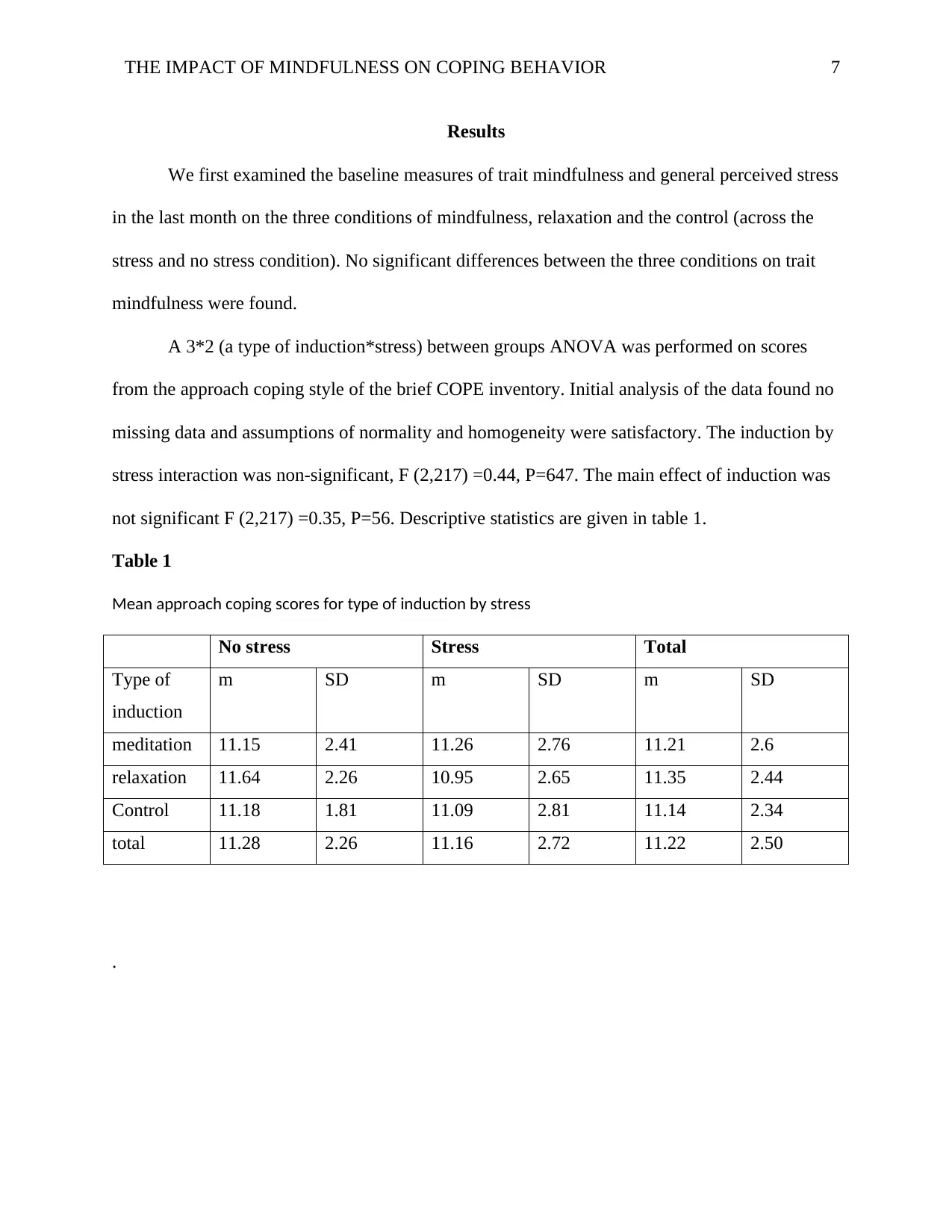
THE IMPACT OF MINDFULNESS ON COPING BEHAVIOR 7
Results
We first examined the baseline measures of trait mindfulness and general perceived stress
in the last month on the three conditions of mindfulness, relaxation and the control (across the
stress and no stress condition). No significant differences between the three conditions on trait
mindfulness were found.
A 3*2 (a type of induction*stress) between groups ANOVA was performed on scores
from the approach coping style of the brief COPE inventory. Initial analysis of the data found no
missing data and assumptions of normality and homogeneity were satisfactory. The induction by
stress interaction was non-significant, F (2,217) =0.44, P=647. The main effect of induction was
not significant F (2,217) =0.35, P=56. Descriptive statistics are given in table 1.
Table 1
Mean approach coping scores for type of induction by stress
No stress Stress Total
Type of
induction
m SD m SD m SD
meditation 11.15 2.41 11.26 2.76 11.21 2.6
relaxation 11.64 2.26 10.95 2.65 11.35 2.44
Control 11.18 1.81 11.09 2.81 11.14 2.34
total 11.28 2.26 11.16 2.72 11.22 2.50
.
Results
We first examined the baseline measures of trait mindfulness and general perceived stress
in the last month on the three conditions of mindfulness, relaxation and the control (across the
stress and no stress condition). No significant differences between the three conditions on trait
mindfulness were found.
A 3*2 (a type of induction*stress) between groups ANOVA was performed on scores
from the approach coping style of the brief COPE inventory. Initial analysis of the data found no
missing data and assumptions of normality and homogeneity were satisfactory. The induction by
stress interaction was non-significant, F (2,217) =0.44, P=647. The main effect of induction was
not significant F (2,217) =0.35, P=56. Descriptive statistics are given in table 1.
Table 1
Mean approach coping scores for type of induction by stress
No stress Stress Total
Type of
induction
m SD m SD m SD
meditation 11.15 2.41 11.26 2.76 11.21 2.6
relaxation 11.64 2.26 10.95 2.65 11.35 2.44
Control 11.18 1.81 11.09 2.81 11.14 2.34
total 11.28 2.26 11.16 2.72 11.22 2.50
.
Paraphrase This Document
Need a fresh take? Get an instant paraphrase of this document with our AI Paraphraser
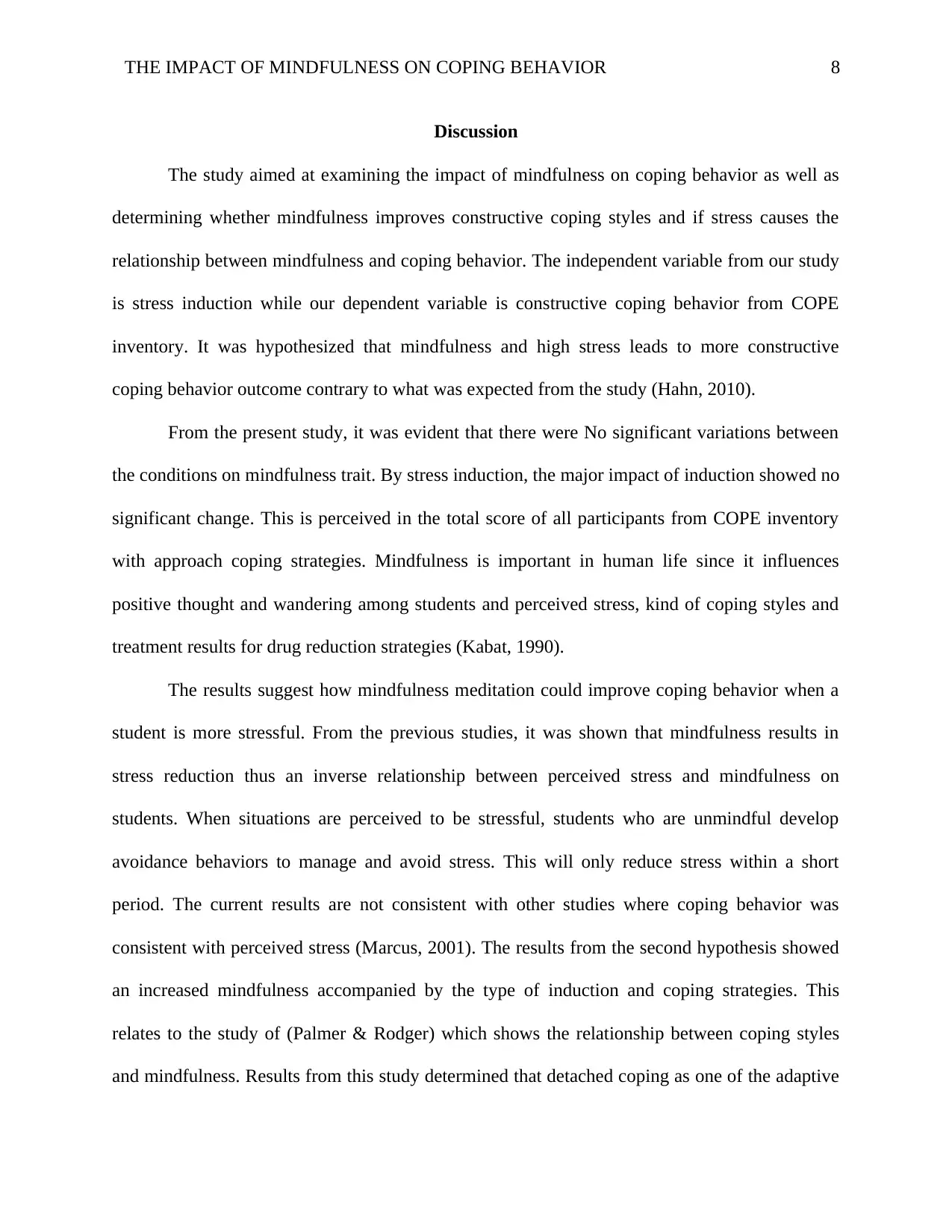
THE IMPACT OF MINDFULNESS ON COPING BEHAVIOR 8
Discussion
The study aimed at examining the impact of mindfulness on coping behavior as well as
determining whether mindfulness improves constructive coping styles and if stress causes the
relationship between mindfulness and coping behavior. The independent variable from our study
is stress induction while our dependent variable is constructive coping behavior from COPE
inventory. It was hypothesized that mindfulness and high stress leads to more constructive
coping behavior outcome contrary to what was expected from the study (Hahn, 2010).
From the present study, it was evident that there were No significant variations between
the conditions on mindfulness trait. By stress induction, the major impact of induction showed no
significant change. This is perceived in the total score of all participants from COPE inventory
with approach coping strategies. Mindfulness is important in human life since it influences
positive thought and wandering among students and perceived stress, kind of coping styles and
treatment results for drug reduction strategies (Kabat, 1990).
The results suggest how mindfulness meditation could improve coping behavior when a
student is more stressful. From the previous studies, it was shown that mindfulness results in
stress reduction thus an inverse relationship between perceived stress and mindfulness on
students. When situations are perceived to be stressful, students who are unmindful develop
avoidance behaviors to manage and avoid stress. This will only reduce stress within a short
period. The current results are not consistent with other studies where coping behavior was
consistent with perceived stress (Marcus, 2001). The results from the second hypothesis showed
an increased mindfulness accompanied by the type of induction and coping strategies. This
relates to the study of (Palmer & Rodger) which shows the relationship between coping styles
and mindfulness. Results from this study determined that detached coping as one of the adaptive
Discussion
The study aimed at examining the impact of mindfulness on coping behavior as well as
determining whether mindfulness improves constructive coping styles and if stress causes the
relationship between mindfulness and coping behavior. The independent variable from our study
is stress induction while our dependent variable is constructive coping behavior from COPE
inventory. It was hypothesized that mindfulness and high stress leads to more constructive
coping behavior outcome contrary to what was expected from the study (Hahn, 2010).
From the present study, it was evident that there were No significant variations between
the conditions on mindfulness trait. By stress induction, the major impact of induction showed no
significant change. This is perceived in the total score of all participants from COPE inventory
with approach coping strategies. Mindfulness is important in human life since it influences
positive thought and wandering among students and perceived stress, kind of coping styles and
treatment results for drug reduction strategies (Kabat, 1990).
The results suggest how mindfulness meditation could improve coping behavior when a
student is more stressful. From the previous studies, it was shown that mindfulness results in
stress reduction thus an inverse relationship between perceived stress and mindfulness on
students. When situations are perceived to be stressful, students who are unmindful develop
avoidance behaviors to manage and avoid stress. This will only reduce stress within a short
period. The current results are not consistent with other studies where coping behavior was
consistent with perceived stress (Marcus, 2001). The results from the second hypothesis showed
an increased mindfulness accompanied by the type of induction and coping strategies. This
relates to the study of (Palmer & Rodger) which shows the relationship between coping styles
and mindfulness. Results from this study determined that detached coping as one of the adaptive
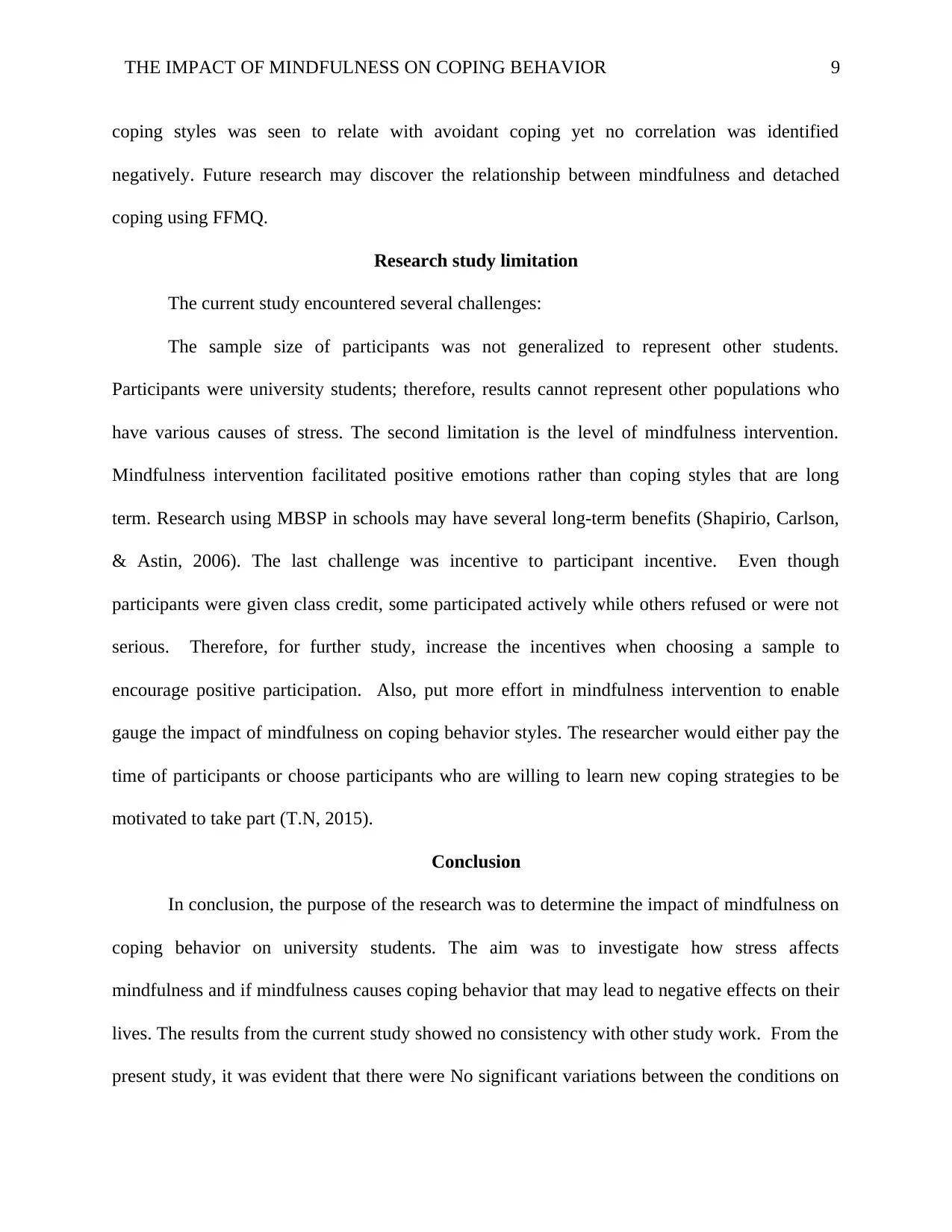
THE IMPACT OF MINDFULNESS ON COPING BEHAVIOR 9
coping styles was seen to relate with avoidant coping yet no correlation was identified
negatively. Future research may discover the relationship between mindfulness and detached
coping using FFMQ.
Research study limitation
The current study encountered several challenges:
The sample size of participants was not generalized to represent other students.
Participants were university students; therefore, results cannot represent other populations who
have various causes of stress. The second limitation is the level of mindfulness intervention.
Mindfulness intervention facilitated positive emotions rather than coping styles that are long
term. Research using MBSP in schools may have several long-term benefits (Shapirio, Carlson,
& Astin, 2006). The last challenge was incentive to participant incentive. Even though
participants were given class credit, some participated actively while others refused or were not
serious. Therefore, for further study, increase the incentives when choosing a sample to
encourage positive participation. Also, put more effort in mindfulness intervention to enable
gauge the impact of mindfulness on coping behavior styles. The researcher would either pay the
time of participants or choose participants who are willing to learn new coping strategies to be
motivated to take part (T.N, 2015).
Conclusion
In conclusion, the purpose of the research was to determine the impact of mindfulness on
coping behavior on university students. The aim was to investigate how stress affects
mindfulness and if mindfulness causes coping behavior that may lead to negative effects on their
lives. The results from the current study showed no consistency with other study work. From the
present study, it was evident that there were No significant variations between the conditions on
coping styles was seen to relate with avoidant coping yet no correlation was identified
negatively. Future research may discover the relationship between mindfulness and detached
coping using FFMQ.
Research study limitation
The current study encountered several challenges:
The sample size of participants was not generalized to represent other students.
Participants were university students; therefore, results cannot represent other populations who
have various causes of stress. The second limitation is the level of mindfulness intervention.
Mindfulness intervention facilitated positive emotions rather than coping styles that are long
term. Research using MBSP in schools may have several long-term benefits (Shapirio, Carlson,
& Astin, 2006). The last challenge was incentive to participant incentive. Even though
participants were given class credit, some participated actively while others refused or were not
serious. Therefore, for further study, increase the incentives when choosing a sample to
encourage positive participation. Also, put more effort in mindfulness intervention to enable
gauge the impact of mindfulness on coping behavior styles. The researcher would either pay the
time of participants or choose participants who are willing to learn new coping strategies to be
motivated to take part (T.N, 2015).
Conclusion
In conclusion, the purpose of the research was to determine the impact of mindfulness on
coping behavior on university students. The aim was to investigate how stress affects
mindfulness and if mindfulness causes coping behavior that may lead to negative effects on their
lives. The results from the current study showed no consistency with other study work. From the
present study, it was evident that there were No significant variations between the conditions on
⊘ This is a preview!⊘
Do you want full access?
Subscribe today to unlock all pages.

Trusted by 1+ million students worldwide
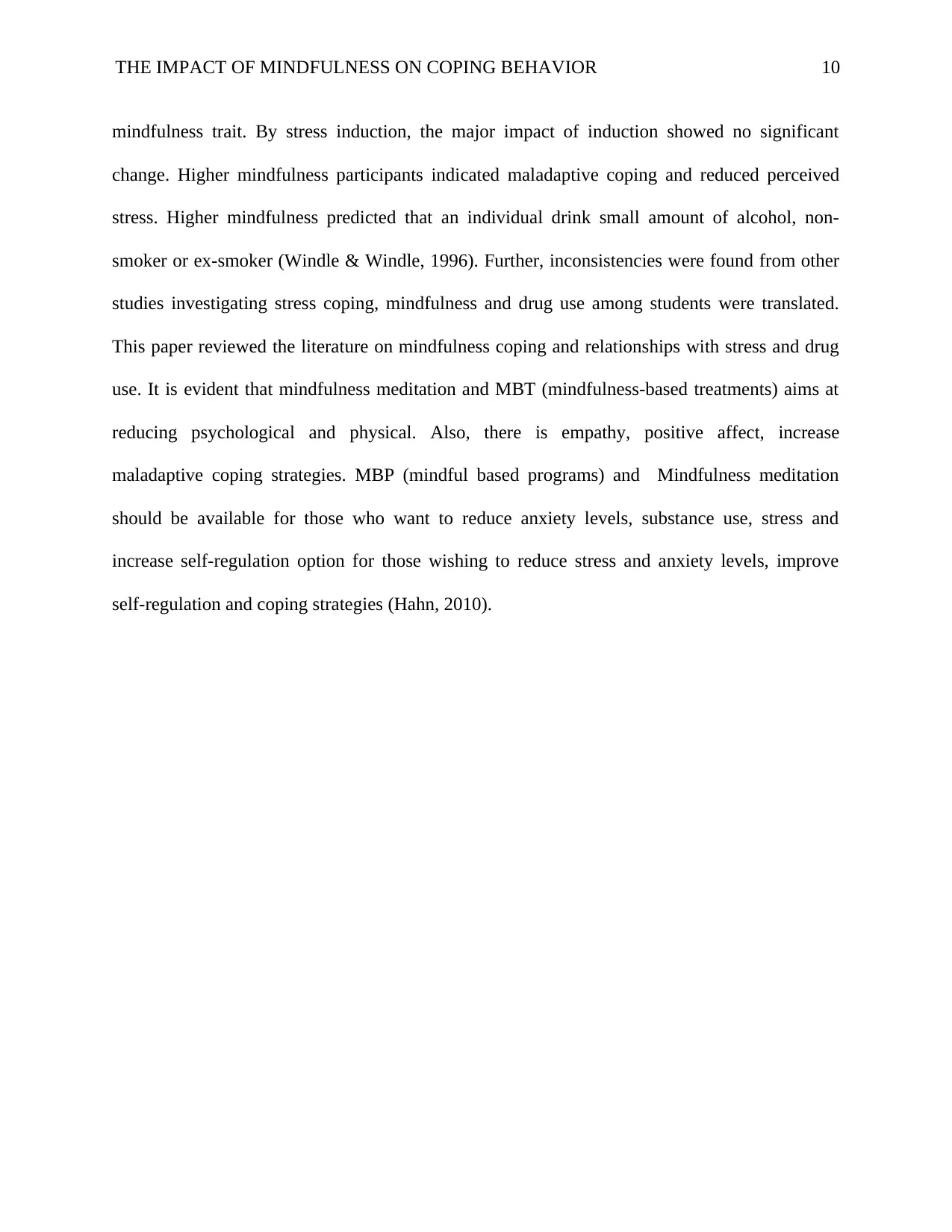
THE IMPACT OF MINDFULNESS ON COPING BEHAVIOR 10
mindfulness trait. By stress induction, the major impact of induction showed no significant
change. Higher mindfulness participants indicated maladaptive coping and reduced perceived
stress. Higher mindfulness predicted that an individual drink small amount of alcohol, non-
smoker or ex-smoker (Windle & Windle, 1996). Further, inconsistencies were found from other
studies investigating stress coping, mindfulness and drug use among students were translated.
This paper reviewed the literature on mindfulness coping and relationships with stress and drug
use. It is evident that mindfulness meditation and MBT (mindfulness-based treatments) aims at
reducing psychological and physical. Also, there is empathy, positive affect, increase
maladaptive coping strategies. MBP (mindful based programs) and Mindfulness meditation
should be available for those who want to reduce anxiety levels, substance use, stress and
increase self-regulation option for those wishing to reduce stress and anxiety levels, improve
self-regulation and coping strategies (Hahn, 2010).
mindfulness trait. By stress induction, the major impact of induction showed no significant
change. Higher mindfulness participants indicated maladaptive coping and reduced perceived
stress. Higher mindfulness predicted that an individual drink small amount of alcohol, non-
smoker or ex-smoker (Windle & Windle, 1996). Further, inconsistencies were found from other
studies investigating stress coping, mindfulness and drug use among students were translated.
This paper reviewed the literature on mindfulness coping and relationships with stress and drug
use. It is evident that mindfulness meditation and MBT (mindfulness-based treatments) aims at
reducing psychological and physical. Also, there is empathy, positive affect, increase
maladaptive coping strategies. MBP (mindful based programs) and Mindfulness meditation
should be available for those who want to reduce anxiety levels, substance use, stress and
increase self-regulation option for those wishing to reduce stress and anxiety levels, improve
self-regulation and coping strategies (Hahn, 2010).
Paraphrase This Document
Need a fresh take? Get an instant paraphrase of this document with our AI Paraphraser
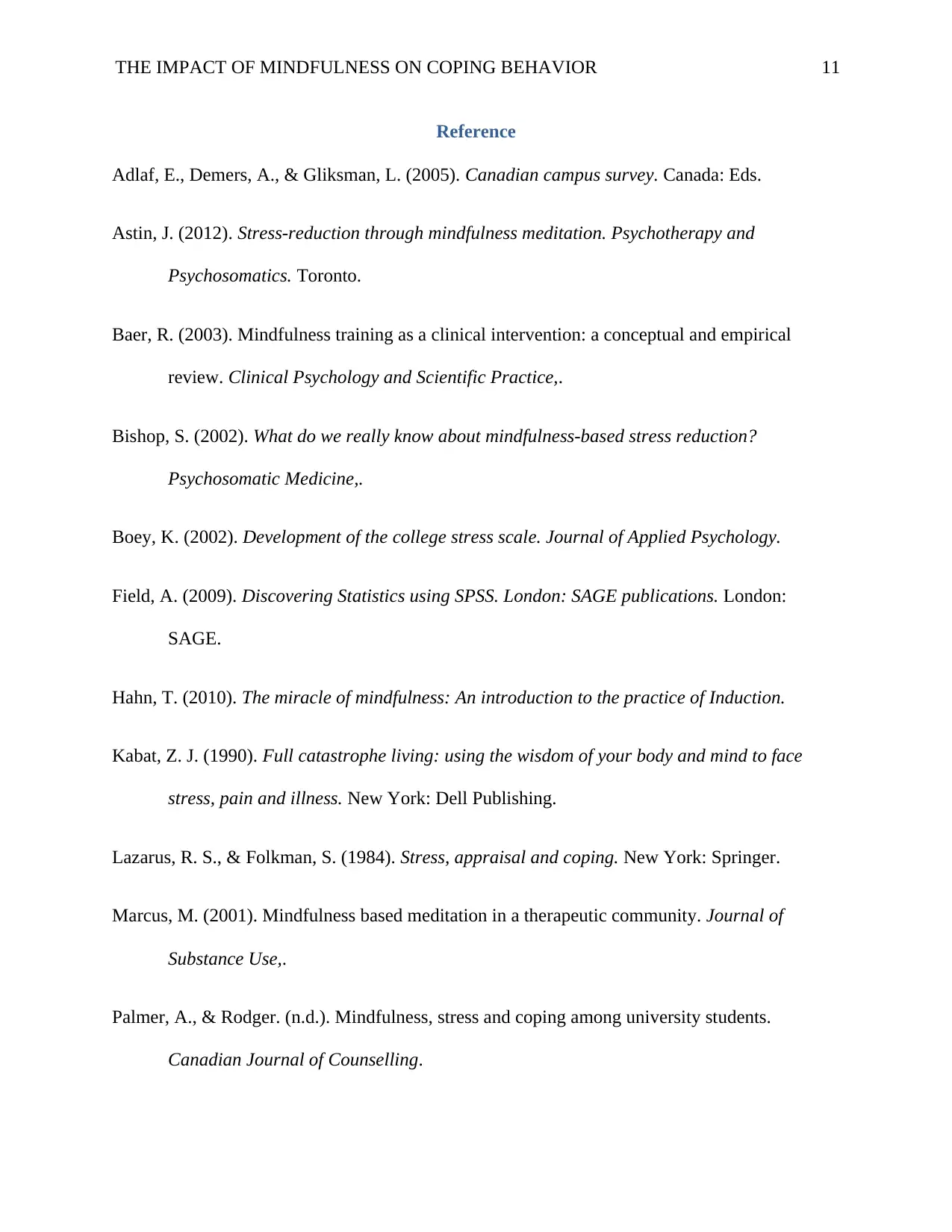
THE IMPACT OF MINDFULNESS ON COPING BEHAVIOR 11
Reference
Adlaf, E., Demers, A., & Gliksman, L. (2005). Canadian campus survey. Canada: Eds.
Astin, J. (2012). Stress-reduction through mindfulness meditation. Psychotherapy and
Psychosomatics. Toronto.
Baer, R. (2003). Mindfulness training as a clinical intervention: a conceptual and empirical
review. Clinical Psychology and Scientific Practice,.
Bishop, S. (2002). What do we really know about mindfulness-based stress reduction?
Psychosomatic Medicine,.
Boey, K. (2002). Development of the college stress scale. Journal of Applied Psychology.
Field, A. (2009). Discovering Statistics using SPSS. London: SAGE publications. London:
SAGE.
Hahn, T. (2010). The miracle of mindfulness: An introduction to the practice of Induction.
Kabat, Z. J. (1990). Full catastrophe living: using the wisdom of your body and mind to face
stress, pain and illness. New York: Dell Publishing.
Lazarus, R. S., & Folkman, S. (1984). Stress, appraisal and coping. New York: Springer.
Marcus, M. (2001). Mindfulness based meditation in a therapeutic community. Journal of
Substance Use,.
Palmer, A., & Rodger. (n.d.). Mindfulness, stress and coping among university students.
Canadian Journal of Counselling.
Reference
Adlaf, E., Demers, A., & Gliksman, L. (2005). Canadian campus survey. Canada: Eds.
Astin, J. (2012). Stress-reduction through mindfulness meditation. Psychotherapy and
Psychosomatics. Toronto.
Baer, R. (2003). Mindfulness training as a clinical intervention: a conceptual and empirical
review. Clinical Psychology and Scientific Practice,.
Bishop, S. (2002). What do we really know about mindfulness-based stress reduction?
Psychosomatic Medicine,.
Boey, K. (2002). Development of the college stress scale. Journal of Applied Psychology.
Field, A. (2009). Discovering Statistics using SPSS. London: SAGE publications. London:
SAGE.
Hahn, T. (2010). The miracle of mindfulness: An introduction to the practice of Induction.
Kabat, Z. J. (1990). Full catastrophe living: using the wisdom of your body and mind to face
stress, pain and illness. New York: Dell Publishing.
Lazarus, R. S., & Folkman, S. (1984). Stress, appraisal and coping. New York: Springer.
Marcus, M. (2001). Mindfulness based meditation in a therapeutic community. Journal of
Substance Use,.
Palmer, A., & Rodger. (n.d.). Mindfulness, stress and coping among university students.
Canadian Journal of Counselling.
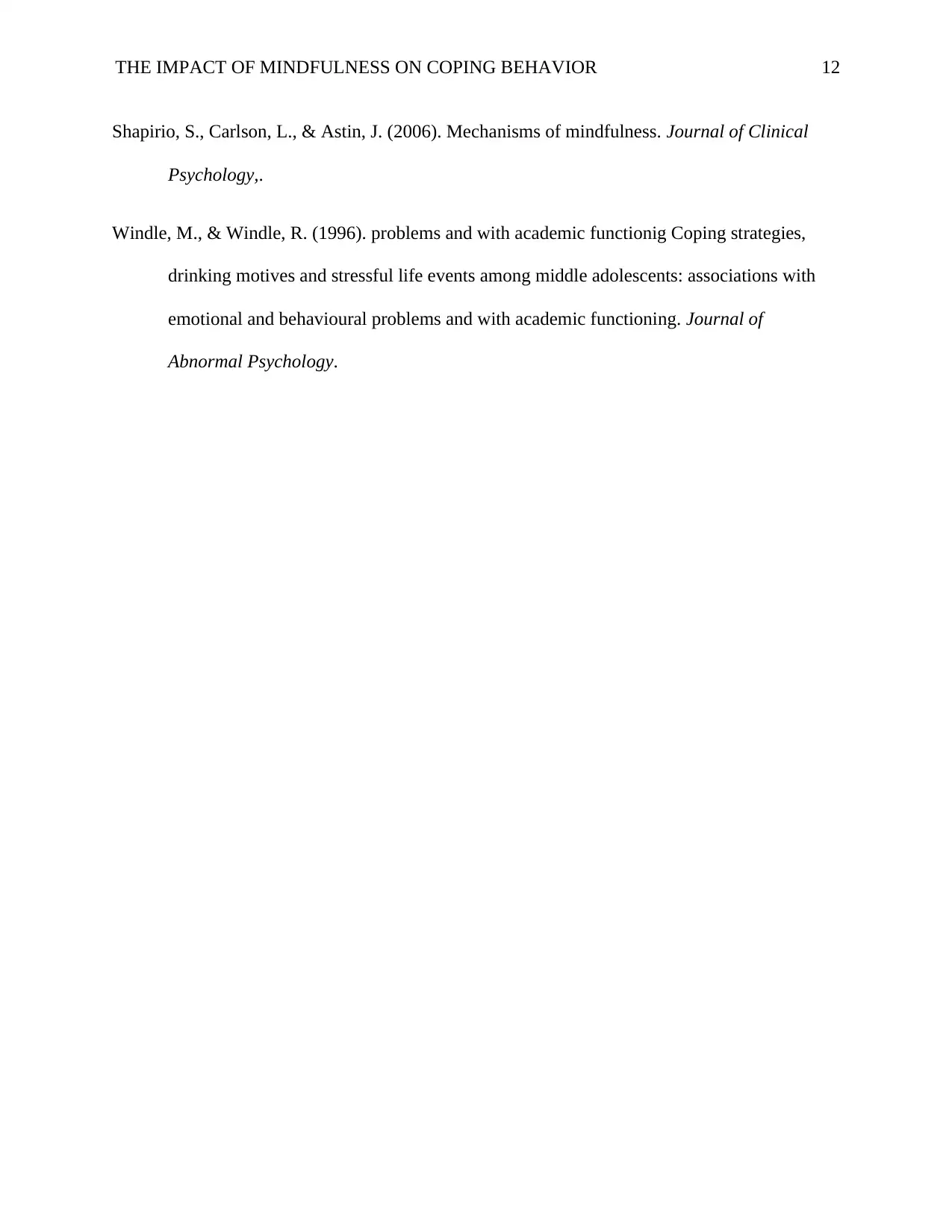
THE IMPACT OF MINDFULNESS ON COPING BEHAVIOR 12
Shapirio, S., Carlson, L., & Astin, J. (2006). Mechanisms of mindfulness. Journal of Clinical
Psychology,.
Windle, M., & Windle, R. (1996). problems and with academic functionig Coping strategies,
drinking motives and stressful life events among middle adolescents: associations with
emotional and behavioural problems and with academic functioning. Journal of
Abnormal Psychology.
Shapirio, S., Carlson, L., & Astin, J. (2006). Mechanisms of mindfulness. Journal of Clinical
Psychology,.
Windle, M., & Windle, R. (1996). problems and with academic functionig Coping strategies,
drinking motives and stressful life events among middle adolescents: associations with
emotional and behavioural problems and with academic functioning. Journal of
Abnormal Psychology.
⊘ This is a preview!⊘
Do you want full access?
Subscribe today to unlock all pages.

Trusted by 1+ million students worldwide
1 out of 12
Related Documents
Your All-in-One AI-Powered Toolkit for Academic Success.
+13062052269
info@desklib.com
Available 24*7 on WhatsApp / Email
![[object Object]](/_next/static/media/star-bottom.7253800d.svg)
Unlock your academic potential
Copyright © 2020–2026 A2Z Services. All Rights Reserved. Developed and managed by ZUCOL.





